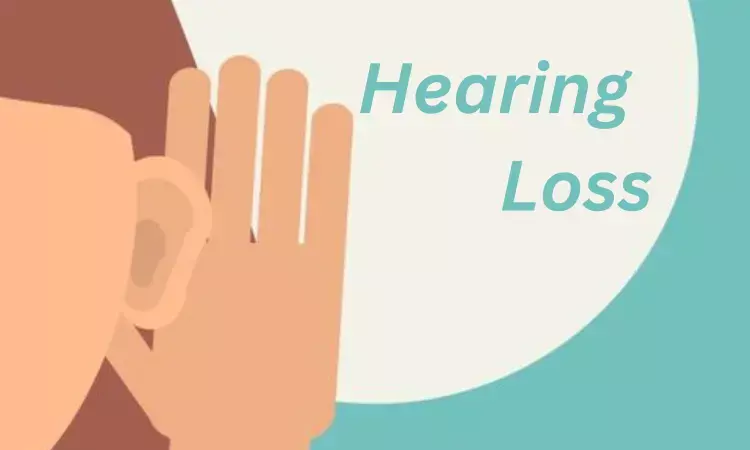- Home
- Medical news & Guidelines
- Anesthesiology
- Cardiology and CTVS
- Critical Care
- Dentistry
- Dermatology
- Diabetes and Endocrinology
- ENT
- Gastroenterology
- Medicine
- Nephrology
- Neurology
- Obstretics-Gynaecology
- Oncology
- Ophthalmology
- Orthopaedics
- Pediatrics-Neonatology
- Psychiatry
- Pulmonology
- Radiology
- Surgery
- Urology
- Laboratory Medicine
- Diet
- Nursing
- Paramedical
- Physiotherapy
- Health news
- Fact Check
- Bone Health Fact Check
- Brain Health Fact Check
- Cancer Related Fact Check
- Child Care Fact Check
- Dental and oral health fact check
- Diabetes and metabolic health fact check
- Diet and Nutrition Fact Check
- Eye and ENT Care Fact Check
- Fitness fact check
- Gut health fact check
- Heart health fact check
- Kidney health fact check
- Medical education fact check
- Men's health fact check
- Respiratory fact check
- Skin and hair care fact check
- Vaccine and Immunization fact check
- Women's health fact check
- AYUSH
- State News
- Andaman and Nicobar Islands
- Andhra Pradesh
- Arunachal Pradesh
- Assam
- Bihar
- Chandigarh
- Chattisgarh
- Dadra and Nagar Haveli
- Daman and Diu
- Delhi
- Goa
- Gujarat
- Haryana
- Himachal Pradesh
- Jammu & Kashmir
- Jharkhand
- Karnataka
- Kerala
- Ladakh
- Lakshadweep
- Madhya Pradesh
- Maharashtra
- Manipur
- Meghalaya
- Mizoram
- Nagaland
- Odisha
- Puducherry
- Punjab
- Rajasthan
- Sikkim
- Tamil Nadu
- Telangana
- Tripura
- Uttar Pradesh
- Uttrakhand
- West Bengal
- Medical Education
- Industry
Dietary supplementation of phytosterols may benefit patients with hearing loss

Argentina: A recent study published in PLOS Biology has shed light on the importance of cholesterol homeostasis in the inner ear as an innovative therapeutic strategy for preventing and/or delaying hearing loss.
During ageing, there is a reduction in cholesterol levels in the inner ear, an effect that is linked to an increased expression of the CYP46A1 (cholesterol 24-hydroxylase), the main enzyme responsible for cholesterol turnover in the brain.
Furthermore, the researchers showed that pharmacological activation of CYP46A1 with the antiretroviral drug efavirenz lowers the cholesterol content in outer hair cells (OHCs), resulting in a decrease in prestin immunolabeling and an increase in the distortion product otoacoustic emissions (DPOAEs) thresholds.
Moreover, dietary supplementation with phytosterols, plant sterols with function and structure similar to cholesterol, was able to rescue the effect of efavirenz administration on the auditory function.
Researchers led by María Eugenia Gomez-Casati, the Institute of Pharmacology, School of Medicine, University of Buenos Aires-CONICET; Mauricio Martin, the Institute of Medical Research Mercedes; and Martín Ferreyra, (INIMEC-CONICET-UNC), National University of Córdoba in Argentina report that age-related hearing loss is associated with a decrease of cholesterol in the inner ear.
Experiments show that phytosterol supplements were able to act in place of the lost cholesterol and prevent sensory dysfunction in mice.
Sensory cells in the inner ear called outer hair cells (OHCs) amplify sounds by changing their length. As we age, these cells lose their ability to stretch in response to sound, preventing sound amplification and leading to age-related hearing loss. Because cholesterol is a key player in the stretch response, and because brain cholesterol has recently been shown to decrease with age, researchers hypothesized that hearing loss might be related to loss of cholesterol in OHCs. This hypothesis was tested in mice.
First, the researchers measured the amount of CYP46A1 in inner ear OHCs because this enzyme helps break down and recycle cholesterol. As expected, they found more CYP46A1 in the inner ears of older mice than in younger mice, and consequently less cholesterol. Next, they showed cause and effect by inducing hearing loss in young mice, as indicated by abnormal inner ear-cell output, by over-activating CYP46A1 with a drug. Finally, they tested whether increasing cholesterol in the brain could counter the drug. Since cholesterol itself cannot actually enter the brain from the blood, the researchers used plant-based cholesterol-like compounds called phytosterols which can. The young mice who got both the CYP46A1-activating drug and 3 weeks of dietary phytosterols displayed improved OHC function.
As phytosterols can be found in many over-the-counter supplements, they could be a convenient way to combat age-related hearing loss. However, directly testing their effects on hearing loss in older mouse models as well as in humans will be necessary before more definite conclusions can be made.
The authors add, “In the present work we show that: 1) ageing triggers cholesterol loss from sensory cells of the inner ear, 2) a retroviral treatment widely employed for HIV/AIDS patients reproduces the cholesterol loss observed in aged individuals and leads to impaired outer hair cells’ function and 3) we found that these defects can be partly reversed by phytosterols supplementation. Our findings are very promising because they provide the first proof-of-principle supporting phytosterols supplementation as a possible approach for prevention or treatment of hearing loss.”
Reference:
Alejandro O. Sodero ,Valeria C. Castagna ,Setiembre D. Elorza,Sara M. Gonzalez-Rodulfo,María A. Paulazo,Jimena A. Ballestero,Mauricio G. Martin ,María Eugenia Gomez-Casati, Phytosterols reverse antiretroviral-induced hearing loss, with potential implications for cochlear aging, https://doi.org/10.1371/journal.pbio.3002257.
Dr Kamal Kant Kohli-MBBS, DTCD- a chest specialist with more than 30 years of practice and a flair for writing clinical articles, Dr Kamal Kant Kohli joined Medical Dialogues as a Chief Editor of Medical News. Besides writing articles, as an editor, he proofreads and verifies all the medical content published on Medical Dialogues including those coming from journals, studies,medical conferences,guidelines etc. Email: drkohli@medicaldialogues.in. Contact no. 011-43720751


